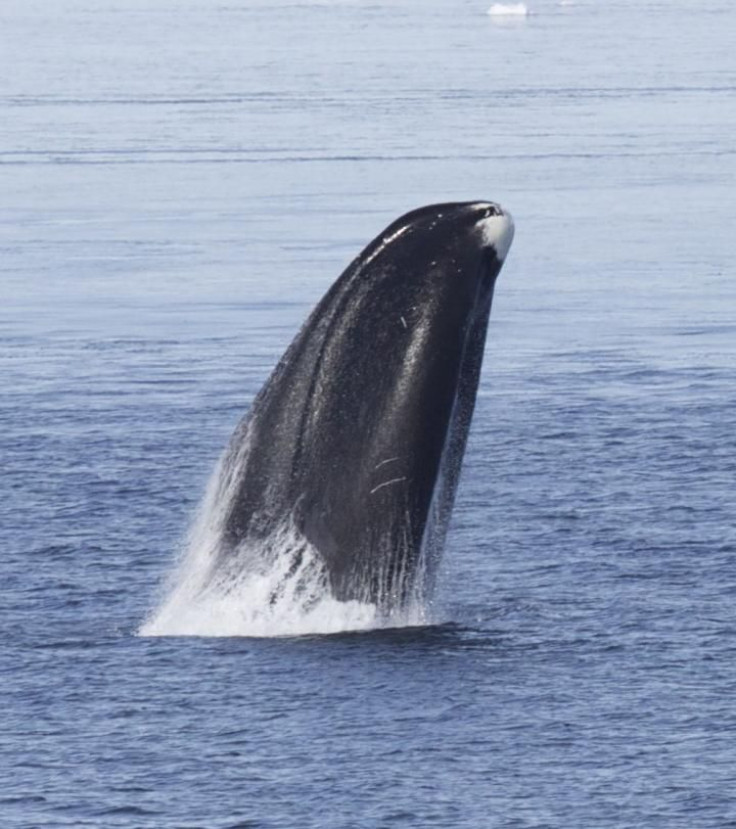Can Marine Biology Help Us Live Forever? Bowhead Whale Can Live 200 Years, Is Cancer Resistant

The bowhead whale is truly a medical marvel. Not only does the marine mammal have the potential to live to the ripe old age of 200 years, but scientists also believe it is naturally resistant to cancer. In a landmark study, researchers from the University of Liverpool have succeeded in completing the whale’s genome and believe that the answer to increased human longevity and cancer resistance lies somewhere in the whale’s DNA.
200-Year-Old Whale
In 2007, a group of Inupiat Eskimos in Alaska got the shock of a lifetime during a whaling expedition. The team managed to reel four bowhead whales, but it’s what they found inside the blubber of one that really turned out to be the “catch of the day.” The team found six ancient harpoons dating back from the late 1800s embedded in the flesh of the whale. Although scientists previously believed that the bowing whale, like most other whales, could live between 80 and 100 years, they estimated that this specific whale was around 211 years old. The other “younger” whales were estimated to be between 135 and 172 years old.
“This just about doubles what everybody thought was the longevity of a large whale,” said Steven Webster, senior marine biologist and a co-founder of the Monterey Bay Aquarium, ABC News reported.
Answers In The DNA
Recently, a team of researchers from the University of Liverpool in England have succeeded in completing the whale’s genome, making it the first of all large whales to have its DNA sequenced. The longevity of the bowhead whale is impressive, but scientists have struggled to figure out exactly why these whales can live so long.
"Our understanding of species' differences in longevity is very poor, and thus our findings provide novel candidate genes for future studies," explained senior author Dr. João Pedro de Magalhães, in a press release. "My view is that species evolved different 'tricks' to have a longer lifespan, and by discovering the 'tricks' used by the bowhead we may be able to apply those findings to humans in order to fight age-related diseases."
de Magalhães told Medical Daily in an email that he believes the bowhead whales evolved this "trick" due to a number of factors. "Large whales like the bowhead have few natural predators which allows them to evolve a life history strategy of slow growth and delayed reproduction and also evolve natural mechanisms that suppress age-related diseases and degeneration," wrote de Magalhães.
The team hopes that uncovering the whale’s DNA will lead to advances in human medicine, especially since it seems that the whales are naturally resistant to cancer. Although cancer has been found in these whales,de Magalhães informed Medical Daily that it is very rare. This is an enormous feat, since the whale has over 1,000 times more cells than humans and therefore would theoretically have an even increased risk of cancer.
In order to determine which whale genes are involved in longevity, Magalhães and his colleagues plan on breeding mice that will express various bowhead genes.
"Long-term we may be able to discover ways of fine tuning longevity assurance mechanisms based on findings from long-lived species like bowheads, for example by identifying longevity or cancer-resistance genes that we could then manipulate therapeutically," wrote de Magalhães. "Most research on human diseases is usually based on animal models that develop the disease under study at a higher incidence and rate than normal. The use of disease-resistant organisms to identify genes, mechanisms and processes that protect against (rather than cause) disease is an unexplored paradigm."
Source: Keane M, Semeiks J, Thomsen B, de Magalhães JP. Insights into the Evolution of Longevity from the Bowhead Whale Genome. Cell Reports. 2015.
Update: The direct quotes from Dr. João Pedro de Magalhães were recently added.



























